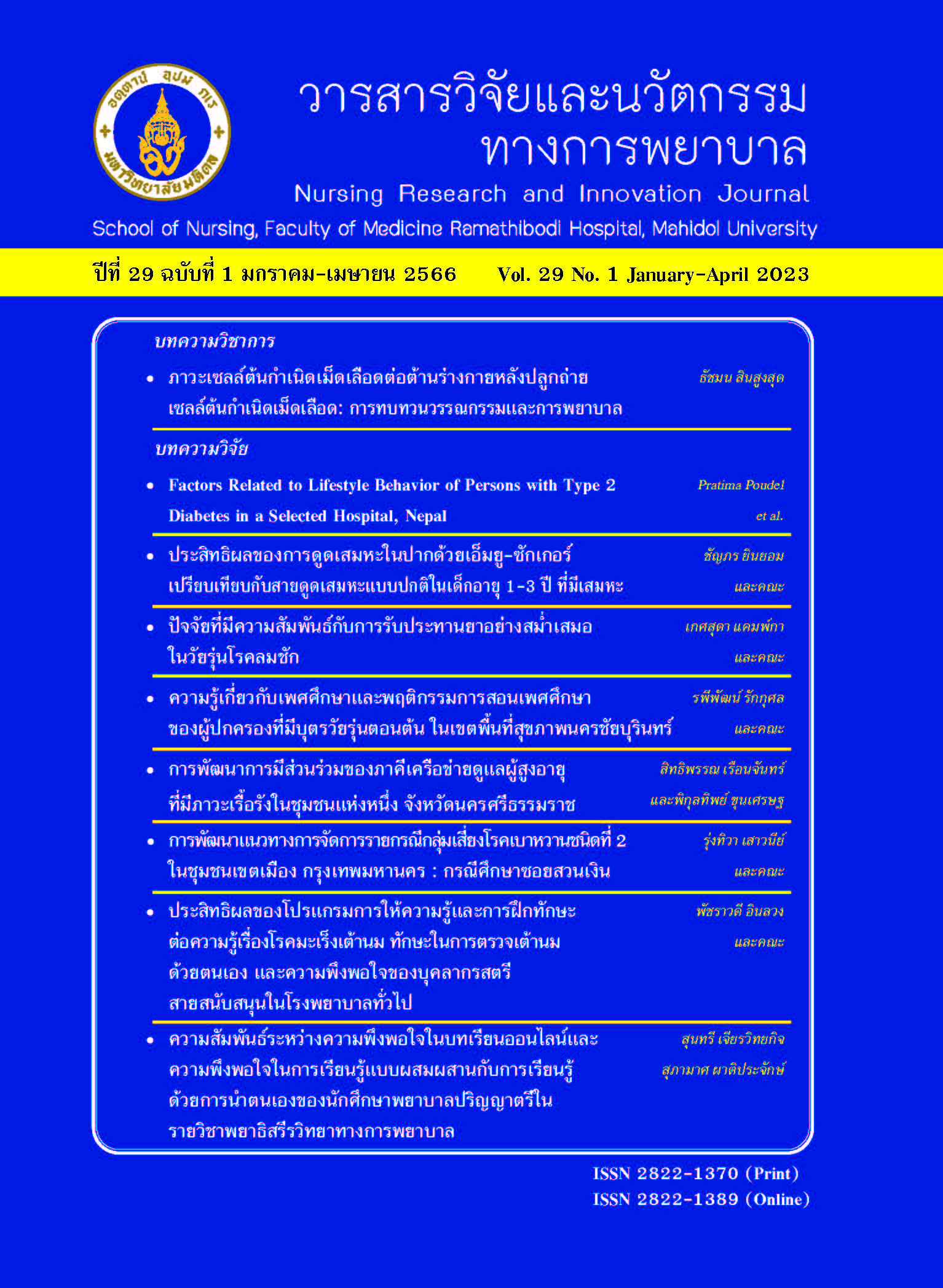Development of Case Management for Persons with Type 2 Prediabetes in an Urban Community, Bangkok Metropolitan: A Case Study of Suan-ngoen Community
Main Article Content
Abstract
This action research aimed to examine the effect of case management for persons with type 2 prediabetes in the Suan-ngoen community and to explore problems, barriers, problemsolving,and needs for behavior modification of persons with prediabetes who did not achieve the goal. The sample was persons living in an urban community in Bangkok Metropolitan, aged 35 years and over, with diabetes risk factors. The sample was recruited with purposive sampling to obtain 30 cases. The research was conducted in two phases: Phase 1: using case management,and Phase 2: using a qualitative case study approach among those that did not achieve the goal.The data were analyzed using descriptive statistics, paired-sample t-test and Wilcoxon-signed rank test to compare the diabetes knowledge scores, health behavior scores, capillary fasting blood glucose values, body mass index, and waist circumferences before and after receiving case management in Phase 1. The qualitative analysis of the case study approach was used in Phase 2.The results showed that at the posttest, the sample had higher mean diabetic knowledge scores,and health behaviors were significantly higher than those at the pretest. Clinical outcomes, including capillary fasting blood glucose, body mass index, and waist circumference, at the posttest were significantly lower than those at the pretest. The participants, who did not achieve the goal, needed to use a case management program to solve the problems and minimize the barriers. The results after Phase 2 showed that health behaviors scores changed from moderate to high levels. Thus,case management for people with type 2 prediabetes in an urban community helps reduce the risk of diabetes mellitus. Therefore, community nurses should apply case management programs for persons with chronic diseases and at risk for non-communicable diseases to improve health status and delay possible complications.
Keywords : Case management, Clinical outcomes, Health behavior, Type 2 prediabet
Article Details

This work is licensed under a Creative Commons Attribution-NonCommercial-NoDerivatives 4.0 International License.
บทความ ข้อมูล เนื้อหา รูปภาพ ฯลฯ ที่ได้รับการตีพิมพ์ในรามาธิบดีพยาบาลสาร ถือเป็นลิขสิทธิ์ของวารสาร หากบุคคลหรือหน่วยงานใดต้องการนำทั้งหมดหรือส่วนหนึ่งส่วนใดไปเผยแพร่หรือเพื่อกระทำการใด ใด จะต้องได้รับอนุญาตเป็นลายลักษณ์อักษรจากรามาธิบดีพยาบาลสารก่อนเท่านั้น
References
Association AD. Standards of medical care in diabetes 2017. Diabetes care. 2017;40(0149-5992):1-135.
World Health Organization. Global report on diabetes [Internet]. 2016[cited 2019 July 15]. Available from:https://apps.who.int/iris/bitstream/10665/204871/1/9789241565257_eng.pdf
Eakpharakorn W, Puckcharern H, Satheannoppakao W.Report of 6th Thai health survey by physical examination 2019-2020.1sted. Nonthaburi:Augsorn Graphic and Design; 2021. (in Thai)
Division of Non-Communicable Diseases. Number and morbidity/death rate in 2016–2019 [Internet].2019[cited 2022 Jun 27]. Available from: http://www.thaincd.com/2016/mission/documents-detail.php?id=13893&tid=32&gid=1-020
Community Health Promotion Center, Faculty of Medicine Ramathibodi Hospital. List of survey results 8 Phayathai community. n.p.; 2019. (in Thai)
Bommer C, Sagalova V, Heesemann E, Manne-Goehler J, Atun R, Barnighausen T, et al. Global economic burden of diabetes in adults: projections from 2015 to 2030.Diabetes Care. 2018;41(5):963-70.
Choochote K,Upakdee N. Expenditure of diabetes mellitus according to classification systems for outpatient payment at Bangbuathong hospital. Journal of Health Systems Research. 2018;12(4):645-56. (in Thai)
DM Thai, Thai endocrine and DMS. Guideline diabetes care 2017. [Internet]. 2017[cited 2019 Jul 25]. Available from: https://www.dmthai.org/index.php/knowledge/healthcare-providers/cpg/443-guideline-diabetescare-2017 (in Thai)
Raman PG. Environmental factors in causation of diabetes mellitus. In: Larramendy M , Soloneski S. editors.Environmental health risk hazardous factors to living species [Internet]. Croatia: IntechOpen; 2016.p.230-245.[cited 2019 July 15]. Available from: https://www.
intechopen.com/chapters/50298
Suphunnakul P, Charonesrimaung S, Singhadej O,Songthap A, Junsukon E. Factors predicting preventive behaviors of type 2 pre-diabetes in Mueang District,Phitsanulok Province, Thailand. Journal of Public Health and Development. 2018;16(3):55-66. (in Thai)
Case Manager Society of America. Definition of case management. [Internet]. 2021 [cited 2022 March 18].Available from: https://cmsa.org/who-we-are/whatis-a-case-manager/
Potirud T, Pranfan S, Songkror K. Effects of the selfmanagement supporting program on self-management behaviors and HbA1c level among persons with type 2 diabetes mellitus at Chiang Klang Hospital, Nan Province.Thai Journal of Nursing. 2020;69(2):11-20. (in Thai)
Van Puffelen AL, Rijken M, Heijmans M, Nijpels G,Schellevis FG, Diacourse study group. Effectiveness of a self-management support program for type 2 diabetes patients in the first years of illness: results from a randomized controlled trial. PLoS One. 2019;14(6):
Chumchiang P. The effects of self-management support program on health behaviors and body mass index in people with pre-diabetes. Journal of Nursing, Public Health and Education. 2018;19(1):108-19. (in Thai)
Glasgow RE, Emont S, Miller DC. Assessing delivery of the five ‘As’ for patient-centered counseling. Health Promot Int. 2006;21(3):245-55.
Namwong T, Klinchart R, Ratchavichai S. The effects of self-management supporting program on self-management behaviors in insulin injection among type 2 diabetic patients. Journal of Phrapokklao Nursing College,Chanthaburi .2018;29(2):186-96. (in Thai)
Namwong T, Klinchart R, Ratchavichai S, Khapol P and Thongpakdee N. Development of promoting selfmanagement model among uncontrolled diabetic patients.Nursing Journal of the Ministry of Public Health. 2019;29(3):179-93. (in Thai)
Cohen J.Statistical power analysis for the behavioral scienes.2nded.New Jersey:Lawrence Erlbaum Associates;1988: 281-406.
Changwang S, Phitayaphinan T and Chutipathana N.Factors related to self-care behavior for prevention of diabetes mellitus and hypertension among population groups at risk. The Southern College Network Journal of Nursing and Public Health. 2016; 3(1): 197-202.
Smilkstein G, Ashworth C, Montano D. Validity and reliability of the family APGAR as a test of family function.The Journal of Family Practice. 1982;15(2):303-11.
Department of Mental Health. Guidelines for the use of mental health tools for health personnel in community hospitals 2015. 2nd ed. Nonthaburi: Agricultural Cooperative Community of Thailand Printing; 2015.(in Thai)
Silpakit O. Srithanya stress scale. Journal of Mental Health of Thailand. 2008;16(3):177-85. (in Thai)
Flyvbjerg B. Case study. In N. K. Denzin and Y. S. Lincoln(eds.). The Sage hand-book of qualitative research. 4th ed. Thousand Oaks, CA: Sage; 2011. p.301–16.
Crowe S, Cresswell K, Robertson A, Huby G, Avery A, Sheikh A. The case study approach. BMC Med Res Methodol. 2011;11(100):1-9.
Konyanee S and Tassana-iem S. The Effect of the application of food, exercise, emotion, non-smoking,alcohol cessation and social support to reduce the risk of diabetes and hypertension among new risk groups.Ratchaphruek Journal. 2019;17(2):95-104. (in thai)


